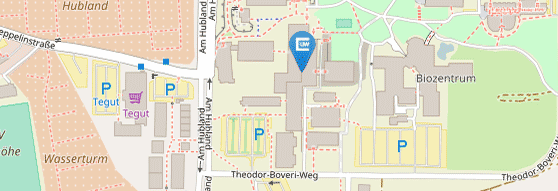Learning Outcomes
- After successfully completing the master's program, graduates will have in-depth knowledge of scientific work in research and the application of chemistry. They will have specialized in three of the offered areas of focus (inorganic chemistry, organic chemistry, physical chemistry, biochemistry, functional materials, homogeneous catalysis, medicinal chemistry, supramolecular chemistry, or theoretical chemistry) by completing the modules (lectures, seminars, and practical courses) assigned to these areas of focus. In addition to in-depth subject-specific knowledge, they also possess abstract thinking skills, analytical thinking, problem-solving skills, and the ability to structure complex relationships. The fundamentals for this are taught in the above-mentioned courses and tested by means of exams, colloquia, protocols, or presentations.
-
After obtaining their master's degree, graduates have the skills to work on a given scientific problem in a systematic manner and in accordance with the rules of good scientific practice, including, among other things, familiarizing themselves with new areas through literature research and critically classifying and evaluating publications in international journals in the context of scientific literature. They are able to apply the knowledge they have acquired independently and transfer it to new tasks, carry out and document experiments based on chemical methods in a structured manner, and within a specified time frame, critically analyze the data obtained, and summarize the results in writing. In addition, they will be able to present their independently conducted projects to an audience and defend the chosen methodology in scientific discussions. These skills are taught in the context of research internships and the master's thesis. The achievement of the objectives is assessed through internship reports, the master's thesis, and the presentation of the corresponding results.
- Graduates possess abstract thinking skills, problem-solving abilities, and the capacity to structure complex correlations using an analytical approach. The fundamentals for this are taught in lectures, seminars, and practical courses in various disciplines of chemistry and tested by means of exams, colloquiums, presentations, or reports.
- Graduates are able to apply their theoretical knowledge in practice and can use the scientific methods they have learned to analyze and work on unknown problems from different technical perspectives. They are accustomed to working constructively and goal-oriented in a team of fellow students, colleagues, and/or scientists. The practical relevance is ensured by a high proportion of laboratory internships—both course internships and individual research internships—and, last but not least, by the master's thesis. Success is assessed through internship reports and the master's thesis.
- As a partially interdisciplinary program, the master's program in chemistry promotes interdisciplinary learning, thinking, and understanding from the outset, provided that the appropriate combination of specializations is chosen. Many of the courses are offered in English, thus promoting communication skills in this internationally recognized scientific language. Graduates can profitably apply the in-depth and specialized benowledge base and methodological skills they have acquired, building on the broad foundation of skills acquired in the Bachelor's program in Chemistry, as well as their practiced teamwork and intercultural communication skills, in their professional work.
- Graduates are ready and able to take responsibility for their actions and for others. They have the communication skills to develop complex issues and points of view within a team, present them in a way that is appropriate for the target audience, and defend and further develop them in a reflective manner when faced with differing positions. Students learn and demonstrate these skills of taking responsibility, willingness to discuss, teamwork, personal responsibility, and independence primarily in their independently prepared internship reports and final thesis, the evaluation of which shows the extent to which the goals have been achieved.
- The Master's program in Chemistry allows students to participate in an Erasmus study program or a laboratory internship at a foreign university. The Chemistry Examination Board monitors compliance with scientific standards and ensures that projects are adequate. Students gain valuable personal experience and broaden their linguistic and cultural horizons.
- The ability to critique and reflect (including self-reflection and self-criticism), acquired through practice and encouragement, enables independent thinking and self-determined action that is justified to oneself and others and can be communicated rationally. Students learn these critical thinking and self-reflection skills through feedback from teachers and students on their seminar presentations, which occur frequently in the Master's program.
- Graduates of the Master's program in Chemistry are equipped to take a scientifically sound and well-founded position on socially critical and controversial issues relating to chemical topics. In addition, they are aware of their ethical responsibility towards society and the environment in their work and always reflect critically on their actions. Particularly in the context of individual laboratory internships lasting several weeks to an entire semester and their final thesis, students independently and critically engage with current research topics. This also includes reflecting on the possible consequences of their own work for the environment and society, as well as considering the associated ethical issues. The evaluations of the internship reports and final thesis show the extent to which the objectives have been achieved.


